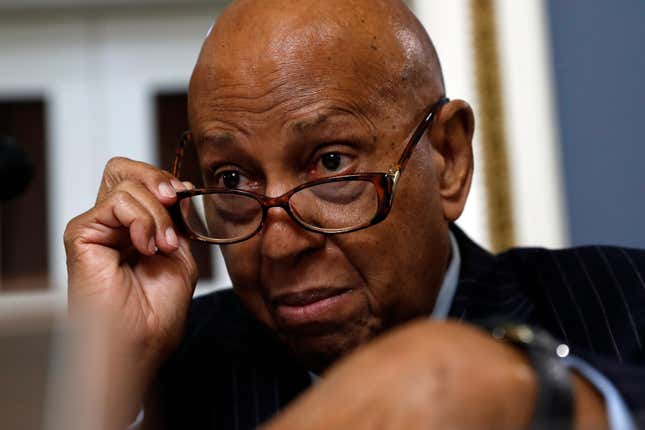
U.S. Rep. Alcee Hastings, the longest-serving member of Florida’s delegation to Washington, D.C., died Tuesday morning at age 84 after a long battle with pancreatic cancer, the Sun Sentinel reports.
Hastings was a civil rights lawyer, judge and congressman who was known for his many political comebacks and bravery against injustice. When he first became a licensed lawyer, Hastings moved to Fort Lauderdale to enter practice with W. George Allen in 1964. Broward County was a tough place for a young Black man in the early 1960s, so much so that a motel wouldn’t rent him a room when he started working at Allen’s law firm. It didn’t help that many of the lawsuits Hastings and Allen filed during the ’60s and ’70s were filed against restaurants that didn’t serve Black folks and Broward County schools over desegregation.
At age 29, Hastings ran for U.S. Senate in 1970 in a race he did not expect to win but to make a few points: to get more attention to his law practice and to show that if white folks can run for that seat, why not Black people?
Congressman Ted Deutch, a South Florida Democrat, described Hastings at a 2019 luncheon in his colleague’s honor as someone “who can stand up to a bully, who can represent people whose voices need to be heard, who’s unafraid to say what needs to be said.”
A high point in Hastings career in the 1970s also became a low point, per the Sun Sentinel:
In 1977, then-Gov. Reubin Askew appointed Hastings as a Broward Circuit Court judge. In 1979, then-President Jimmy Carter nominated Hastings to the U.S. District Court, making him Florida’s first Black federal judge.
But that lifetime appointment lasted just 10 years — and turned into the lowest point of Hastings’ career.
In 1981, Hastings was indicted on charges of conspiring to solicit a $150,000 bribe from an FBI agent posing as a racketeer trying to buy his way out of a prison sentence. In 1983, Hastings’ criminal trial ended when the jury found him not guilty.
Six years later, Congress took up the issue. Concluding he lied during the criminal trial, the House impeached Hastings and the Senate convicted him on eight of 11 articles, removing him from the bench. The Senate did not vote to disqualify him from holding future office.
Howard Finkelstein, a retired four-term Broward County public defender, said the prosecution was retaliation against Hastings’ for refusing to bow to the wishes of powerful, establishment interests, according to the Sun Sentinel.
But Hastings came back.
Three years later, Hastings was elected to Congress, becoming one of three Black Floridians who went to Congress that year. It would be the first time Florida sent a Black representative to Washington since 1877, when Reconstruction ended.
Hastings, who was born in Altamonte Springs and received a law degree from Florida A&M University, was one of the drafters of early 1980s revisions to the Voting Rights Act, which empowered districts to maximize the election chances of minority lawmakers.
A reporter also pointed out his support of immigrants:
“He made it his life’s goal,” said Mitch Ceasar, who met Hastings in 1974, “to fight for a group that had never been spoken for.”
Members of Congress and folks back home in Florida have been paying their respects on Twitter and through statements via their offices.

